Below is the data from the 2023 16" ADAC winter tire test.
Noteworthy performers included the Falken EUROWINTER HS02 with good dry braking, Bridgestone Blizzak LM005 showcasing remarkable wet braking, and the Goodyear UltraGrip 9 Plus excelling in snow and ice braking. On the flip side, the Austone SP 901 displayed weaknesses in wet conditions and aquaplaning scenarios. The Fulda Kristall Control HP2 emerged as a durable option with the longest wear, while the Barum Polaris 5 stood out for fuel efficiency.
The biggest surprise is probably the winner. The now aging Dunlop Winter Sport 5 emerged as the overall victor in the 2023 ADAC 16 Inch Tire Test, exhibiting a balanced performance across various testing categories. Its well-rounded performance underscores its reliability and suitability for diverse road conditions, making it a commendable choice for motorists seeking a harmonized blend of safety, comfort, and efficiency
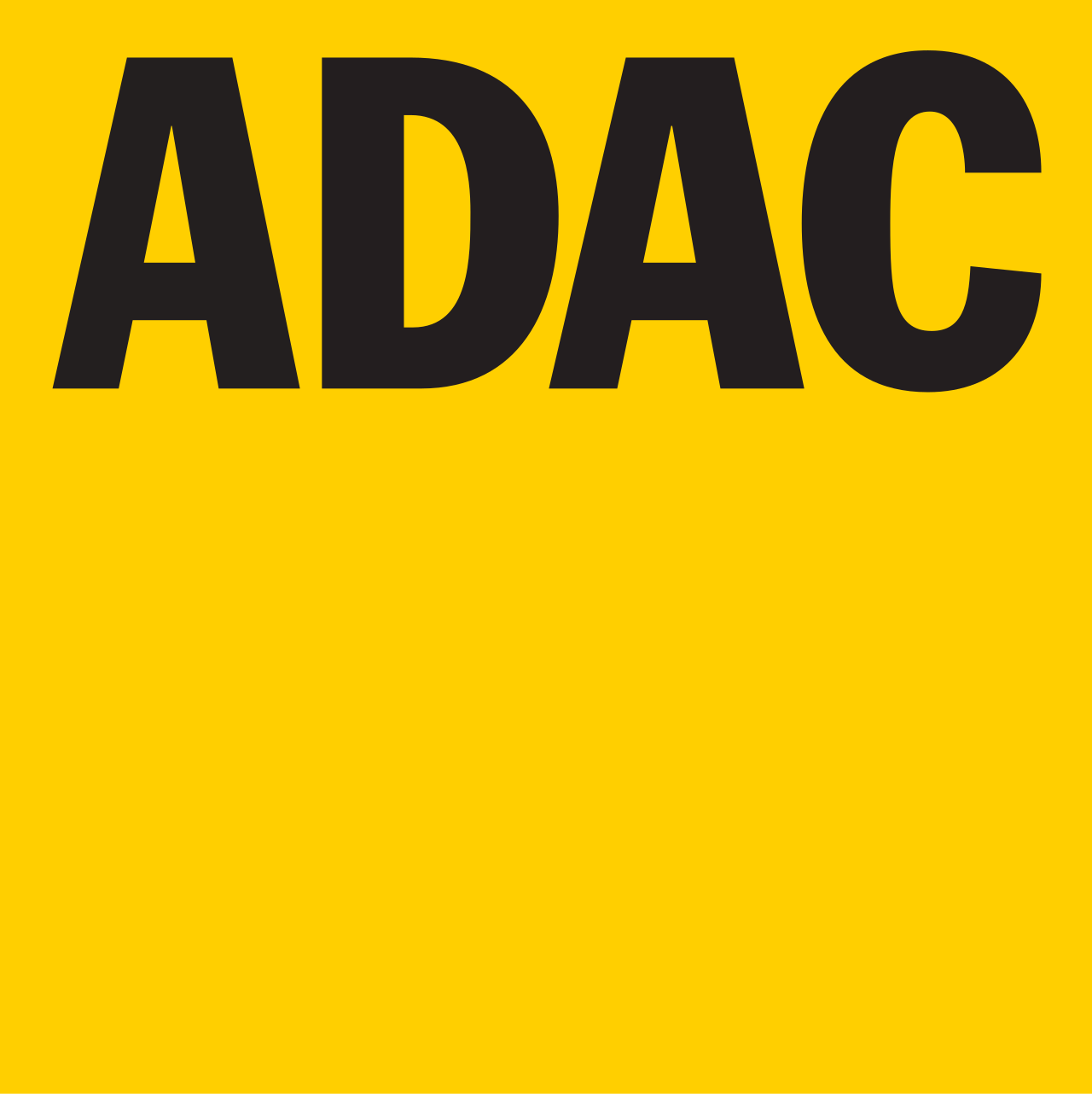
6 categories (12 tests)
| Test Category | Best Performer | Worst Performer | Difference |
|---|---|---|---|
| Dry (1 tests) | |||
| Dry Braking | ▲ Falken EUROWINTER HS02: 41.4 M | ▼ Uniroyal WinterExpert: 45.6 M | 4.2 M (9.2%) |
| Wet (4 tests) | |||
| Wet Braking | ▲ Bridgestone Blizzak LM005: 35.2 M | ▼ Austone SP 901: 45.6 M | 10.4 M (22.8%) |
| Wet Braking - Concrete | ▲ Bridgestone Blizzak LM005: 36.4 M | ▼ Austone SP 901: 45.1 M | 8.7 M (19.3%) |
| Straight Aqua | ▲ Firestone Winterhawk 4: 90.6 Km/H | ▼ Austone SP 901: 69.1 Km/H | 21.5 Km/H (31.1%) |
| Curved Aquaplaning | ▲ Firestone Winterhawk 4: 3.9 m/sec2 | ▼ Austone SP 901: 2.1 m/sec2 | 1.8 m/sec2 (85.7%) |
| Snow (2 tests) | |||
| Snow Braking | ▲ Goodyear UltraGrip 9 Plus: 9.5 M | ▼ Falken EUROWINTER HS02: 11.4 M | 1.9 M (16.7%) |
| Snow Traction | ▲ BFGoodrich gForce Winter 2: 265.3 N | ▼ Lassa Snoways 4: 223.6 N | 41.7 N (18.6%) |
| Ice (1 tests) | |||
| Ice Braking | ▲ Goodyear UltraGrip 9 Plus: 18.6 M | ▼ Kleber Krisalp HP3: 21.8 M | 3.2 M (14.7%) |
| Comfort (1 tests) | |||
| Noise | ▲ Austone SP 901: 70.4 dB | ▼ Fulda Kristall Control HP2: 74.1 dB | 3.7 dB (5.0%) |
| Value (3 tests) | |||
| Wear | ▲ Fulda Kristall Control HP2: 56300 KM | ▼ Bridgestone Blizzak LM005: 34800 KM | 21,500.0 KM (61.8%) |
| Fuel Consumption | ▲ Barum Polaris 5: 5.5 l/100km | ▼ Austone SP 901: 5.8 l/100km | 0.3 l/100km (5.2%) |
| Abrasion | ▲ Michelin Alpin 6: 51 mg/km/t | ▼ Uniroyal WinterExpert: 90 mg/km/t | 39.0 mg/km/t (43.3%) |
Dry
In the dry braking test, the Falken EUROWINTER HS02 stood out with a shortest braking distance of 41.4 M, showcasing its superior stopping power on dry surfaces. On the other hand, the Uniroyal WinterExpert lagged with a longer braking distance of 45.6 M, indicating room for improvement in dry braking performance.
Wet
For wet braking the Bridgestone Blizzak LM005 demonstrated excellent braking performance, stopping at a distance of 35.2 M. Conversely, the Austone SP 901 had a less desirable outcome with a braking distance of 45.6 M, showing its limitations in wet conditions.
Again, the Bridgestone Blizzak LM005 showed strong performance on concrete wet surfaces with a braking distance of 36.4 M, indicating its reliable wet grip. The Austone SP 901 again struggled with a distance of 45.1 M, reflecting its weaker performance in these conditions.
In the straight aquaplaning test, the Firestone Winterhawk 4 exhibited impressive control, maintaining a speed of 90.6 Km/H. The Austone SP 901, on the other hand, was significantly slower with a speed of 69.1 Km/H, showing susceptibility to aquaplaning.
The Firestone Winterhawk 4 again showcased superior control in curved aquaplaning scenarios with a speed of 3.9 m/sec², indicating its strong aquaplaning resistance. The Austone SP 901 struggled with a speed of 2.1 m/sec², displaying a higher tendency to lose control.
Snow
In snowy conditions, the Goodyear UltraGrip 9 Plus excelled with a short braking distance of 9.5 M, demonstrating reliable stopping power. In contrast, the Falken EUROWINTER HS02 required a longer distance of 11.4 M to halt, suggesting less effectiveness in snow braking.
The BFGoodrich gForce Winter 2 led in snow traction with a force of 265.3 N, indicating strong grip on snowy surfaces. The Lassa Snoways 4, however, showed weaker traction with a force of 223.6 N, hinting at its limitations in snow traction.
Ice
The Goodyear UltraGrip 9 Plus performed exceptionally in ice braking, stopping at 18.6 M, showcasing its capability on icy surfaces. The Kleber Krisalp HP3 had a longer braking distance of 21.8 M, reflecting a lesser performance on ice.
Comfort
Noise test results indicated a quieter ride with Austone SP 901 registering 70.4 dB, thus offering a more comfortable driving experience. In contrast, the Fulda Kristall Control HP2 was louder with 74.1 dB, which might be perceived as less comfortable.
Value
In the wear test, the Fulda Kristall Control HP2 showcased outstanding durability with 56300 KM, promising a longer tire lifespan. The Bridgestone Blizzak LM005, however, showed quicker wear with 34800 KM, indicating a shorter tire lifespan.
The Barum Polaris 5 proved to be fuel-efficient with a consumption of 5.5 l/100km, making it a more economical choice. The Austone SP 901 consumed more fuel at 5.8 l/100km, making it less economical in comparison.
The Michelin Alpin 6 exhibited the lowest abrasion with 51 mg/km/t, suggesting better material endurance. On the other hand, the Uniroyal WinterExpert had higher abrasion at 90 mg/km/t, indicating a propensity for quicker material degradation1.
Results
1st: Dunlop Winter Sport 5 | |||||||||||||||||||||||||||||||||||||||||||||||||||||||||||||||||||||||||||||||
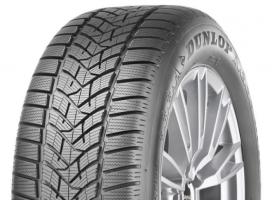
|
The DUNLOP Winter Sport 5 demonstrates precise steering and good safety margins on dry roads, including quick stabilization after evasive maneuvers. Braking performance from 100 km/h is rated as good within the test field. On wet roads, the WINTER SPORT 5 tire performs well in all sub-criteria, including above-average scores in braking and handling. However, its performance in longitudinal aquaplaning is below the average of competitors. On snowy and icy roads, the tire scores above average in braking, acceleration, and handling. Regarding environmental impact, the WINTER SPORT 5 also receives good ratings, offering high projected mileage, low wear, low weight, and decent fuel efficiency. Read Reviews | ||||||||||||||||||||||||||||||||||||||||||||||||||||||||||||||||||||||||||||||
2nd: Michelin Alpin 6 | |||||||||||||||||||||||||||||||||||||||||||||||||||||||||||||||||||||||||||||||
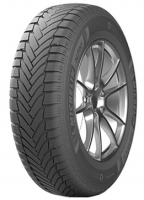
|
The MICHELIN ALPIN 6 performs well on dry roads, offering precise steering and sufficient safety margins, even at the limit. Its braking from 100 km/h is slightly above average. On wet surfaces, the tire excels in braking distance measurements but receives only satisfactory ratings in lateral aquaplaning. Handling is nearly rated as good; for better precision, the tire needs to better integrate longitudinal and lateral forces. On winter roads, the ALPIN 6 scores well, with slightly below-average braking and above-average traction measurements. Its handling and ice braking are rated as good. Environmentally, the ALPIN 6 stands out for its above-average wear resistance and low fuel consumption, attributed to its low weight and low rolling resistance. Noise levels are average. Read Reviews | ||||||||||||||||||||||||||||||||||||||||||||||||||||||||||||||||||||||||||||||
3rd: Goodyear UltraGrip 9+ | |||||||||||||||||||||||||||||||||||||||||||||||||||||||||||||||||||||||||||||||

|
The GOODYEAR UltraGrip 9+ shows minor weaknesses in steering precision and feedback on dry roads but compensates with good safety margins during sudden evasive maneuvers and average braking distances. On wet roads, it performs clearly above average, offering short braking distances and secure, easily controllable handling. In lateral aquaplaning, its performance is rated as good, and it narrowly misses an excellent rating in longitudinal aquaplaning. On winter roads, the UltraGrip 9+ scores above average in braking and slightly above average in traction. While it offers good safety reserves in snow handling, steering could be more precise. In ice braking tests, the UltraGrip 9+ excels with the shortest braking distances. Environmentally, the tire achieves a good rating for its projected lifespan and wear, and it receives the best rating in the test for efficiency. Read Reviews | ||||||||||||||||||||||||||||||||||||||||||||||||||||||||||||||||||||||||||||||
4th: Continental WinterContact TS 870 P | |||||||||||||||||||||||||||||||||||||||||||||||||||||||||||||||||||||||||||||||
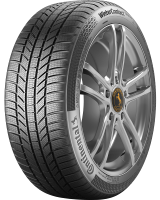
|
The Continental WinterContact TS 870 P exhibits minor weaknesses in steering precision and feedback on dry roads but compensates with good safety reserves in sudden evasive maneuvers and clearly above-average braking distances. On wet roads, the tire performs consistently well across all sub-criteria, including slightly above-average results in braking and aquaplaning. It also offers easy and secure handling. On winter roads, the tire achieves average scores in braking and traction but excels in handling due to its large safety reserves and precise steering. Ice braking performance is average. Environmentally, the tire receives a barely good rating; its wear is average, and its projected lifespan is slightly below average but still rated as good. Efficiency metrics are average. Read Reviews | ||||||||||||||||||||||||||||||||||||||||||||||||||||||||||||||||||||||||||||||
5th: Hankook Winter I cept RS3 | |||||||||||||||||||||||||||||||||||||||||||||||||||||||||||||||||||||||||||||||
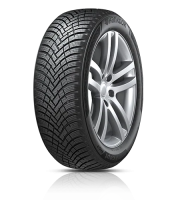
|
The Hankook Winter i*cept RS3 shows minor deficiencies in steering precision and feedback on dry roads but earns a good overall rating due to its safety reserves in sudden evasive maneuvers and braking performance rated as "still good." On wet roads, the tire performs well in braking, longitudinal aquaplaning, and handling, but falls short in lateral aquaplaning with a satisfactory rating. On winter roads, it ranks second-best in the test, excelling in braking and acceleration, and offering secure and precise handling on snow. Its ice braking performance is also above average. Environmentally, the tire misses a good rating due to its below-average projected lifespan, although its wear and efficiency are rated as good. Read Reviews | ||||||||||||||||||||||||||||||||||||||||||||||||||||||||||||||||||||||||||||||
6th: Bridgestone Blizzak LM005 | |||||||||||||||||||||||||||||||||||||||||||||||||||||||||||||||||||||||||||||||
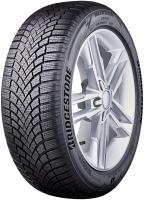
|
The BRIDGESTONE BLIZZAK LM 005 has minor issues with steering precision and feedback on dry roads but maintains a good overall rating due to its safety reserves during sudden evasive maneuvers and average braking distances. On wet roads, it sets the standard, achieving the shortest braking distances in the test and excelling in aquaplaning and handling. On winter roads, it earns a good rating for its decent braking distances, good handling, and safety reserves, although its ice braking performance is below average. Environmentally, the tire falls short of a good rating due to its below-average projected lifespan and satisfactory wear rating. While it scores well in fuel efficiency, its weight is rated as satisfactory. Read Reviews | ||||||||||||||||||||||||||||||||||||||||||||||||||||||||||||||||||||||||||||||
7th: Firestone Winterhawk 4 | |||||||||||||||||||||||||||||||||||||||||||||||||||||||||||||||||||||||||||||||
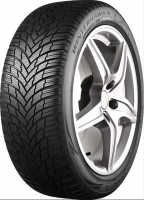
|
The Firestone WINTERHAWK 4 provides satisfactory steering feedback on dry roads and remains stable at the limit, earning a good overall rating for dry conditions due to its good braking performance. On wet roads, the tire performs well in braking and handling, with very good ratings in longitudinal aquaplaning and above-average results in lateral aquaplaning. On winter roads, it scores well for braking and handling but falls short in traction and ice braking, receiving only a satisfactory rating for these criteria. Environmentally, the tire misses a good rating due to its below-average projected lifespan and satisfactory wear. However, it scores well in fuel efficiency and weight. Read Reviews | ||||||||||||||||||||||||||||||||||||||||||||||||||||||||||||||||||||||||||||||
8th: BFGoodrich gForce Winter 2 | |||||||||||||||||||||||||||||||||||||||||||||||||||||||||||||||||||||||||||||||
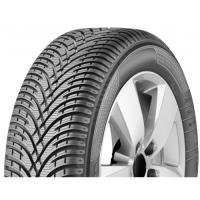
|
The BFGoodrich G-FORCE WINTER 2 provides only satisfactory steering feedback on dry roads but remains stable at the limit. Its braking is rated as "still good," earning it an overall good rating for dry conditions. On wet roads, the tire receives a satisfactory overall rating; while its braking and aquaplaning are rated as good, it struggles in wet handling due to excessive understeer or oversteer. On winter roads, it scores well for braking and handling but falls short in ice braking, receiving a satisfactory rating. Environmentally, the tire achieves a barely good rating; its projected lifespan is rated as just good, its wear is clearly good, and while it performs well in fuel efficiency, its weight is only rated as satisfactory. Read Reviews | ||||||||||||||||||||||||||||||||||||||||||||||||||||||||||||||||||||||||||||||
9th: Fulda Kristall Control HP2 | |||||||||||||||||||||||||||||||||||||||||||||||||||||||||||||||||||||||||||||||
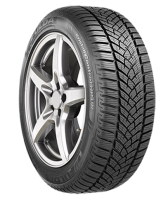
|
The KRISTALL CONTROL HP 2 provides good steering feedback and precision on dry roads, along with good safety margins at the limit. Its braking is also rated as good. On wet roads, the tire receives an overall satisfactory rating; it scores well in aquaplaning but only satisfactory in braking and inadequate in handling due to low grip levels and imprecise steering. On winter roads, it earns a good overall rating due to its strong braking performance on snow and ice, although it falls short in traction and handling. Environmentally, the tire excels across the board, offering the highest projected lifespan in the test, low wear, and above-average performance in fuel efficiency and weight. Read Reviews | ||||||||||||||||||||||||||||||||||||||||||||||||||||||||||||||||||||||||||||||
10th: Kleber Krisalp HP3 | |||||||||||||||||||||||||||||||||||||||||||||||||||||||||||||||||||||||||||||||

|
The Kleber KRISALP HP3 provides only average steering feedback and lacks precision on dry roads, requiring frequent corrections during steering and cornering. Its braking distance is average within the test field and rated as good. On wet roads, the tire achieves a satisfactory overall rating; it performs well in braking and longitudinal aquaplaning but falls short in lateral aquaplaning and wet handling due to excessive understeer or oversteer. On winter roads, it earns a good rating for its decent braking distances and good handling, although its ice braking performance is below average. Environmentally, the tire achieves a barely good rating; its projected lifespan is rated as just good, its wear is clearly good, and while it performs well in fuel efficiency, its weight is slightly above average and rated as satisfactory. Read Reviews | ||||||||||||||||||||||||||||||||||||||||||||||||||||||||||||||||||||||||||||||
11th: Falken EUROWINTER HS02 | |||||||||||||||||||||||||||||||||||||||||||||||||||||||||||||||||||||||||||||||

|
The FALKEN EUROWINTER HS02 provides good steering feedback and safety margins on dry roads, along with above-average braking performance. On wet roads, it excels in braking and longitudinal aquaplaning but receives only a satisfactory rating in lateral aquaplaning and handling. While the tire offers sufficient safety reserves, it lacks precision due to inadequate integration of longitudinal and lateral forces. On winter roads, the tire achieves a satisfactory overall rating, missing good scores in braking, traction, and handling. The vehicle tends to understeer or oversteer early, limiting the handling precision. However, its ice braking performance is average and rated as good. Environmentally, the tire receives a satisfactory overall rating; its projected lifespan and wear are rated as just good, but its higher weight impacts its efficiency rating negatively. Its sustainability, given its production in Turkey, is rated as inadequate. Read Reviews | ||||||||||||||||||||||||||||||||||||||||||||||||||||||||||||||||||||||||||||||
12th: Barum Polaris 5 | |||||||||||||||||||||||||||||||||||||||||||||||||||||||||||||||||||||||||||||||
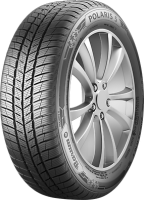
|
The Barum POLARIS 5 provides inadequate steering feedback and precision on dry roads, requiring frequent corrections. The vehicle tends to oversteer during dynamic evasive maneuvers, earning the tire a barely satisfactory rating in limit behavior. Its braking distance is average and rated as good. On wet roads, the tire achieves a satisfactory overall rating, excelling only in longitudinal aquaplaning. It falls short in braking, lateral aquaplaning, and handling due to early understeer or oversteer. On winter roads, it also receives a satisfactory rating, narrowly missing good scores in traction and handling. Its ice braking performance is average. Environmentally, the tire performs well, with good projected lifespan and wear. It also scores well in weight and achieves the best fuel efficiency in the test. Read Reviews | ||||||||||||||||||||||||||||||||||||||||||||||||||||||||||||||||||||||||||||||
13th: Vredestein Wintrac | |||||||||||||||||||||||||||||||||||||||||||||||||||||||||||||||||||||||||||||||
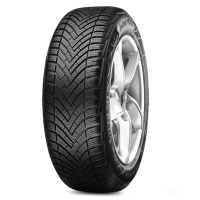
|
The VREDESTEIN WINTRAC provides inadequate steering feedback and precision on dry roads, requiring frequent corrections. The vehicle tends to oversteer during dynamic maneuvers, earning the tire a barely satisfactory rating in limit behavior. Its braking distance is average and rated as good. On wet roads, it performs well in braking and longitudinal aquaplaning but falls short in lateral aquaplaning and handling. While the tire offers sufficient safety reserves, it lacks precision due to inadequate integration of longitudinal and lateral forces. On winter roads, it earns a good rating for its decent braking distances and good handling, although its traction performance is only satisfactory. It secures the second-best result in the test for ice braking. Environmentally, the tire performs well, with good projected lifespan and wear. It also scores well in fuel efficiency and weight. Read Reviews | ||||||||||||||||||||||||||||||||||||||||||||||||||||||||||||||||||||||||||||||
14th: Uniroyal WinterExpert | |||||||||||||||||||||||||||||||||||||||||||||||||||||||||||||||||||||||||||||||

|
The UNIROYAL WinterExpert provides inadequate steering feedback and precision on dry roads, requiring frequent corrections. The vehicle tends to oversteer in dynamic maneuvers but earns a barely satisfactory rating in limit behavior. Its braking distance is below average but still rated as good. On wet roads, it narrowly misses a good rating, performing satisfactorily in braking and handling due to imprecise steering. It excels only in aquaplaning tests. On winter roads, it earns a nearly good rating for its snow braking and handling but falls short in snow traction and ice braking. Environmentally, the tire achieves a satisfactory rating, with both its projected lifespan and wear rated as satisfactory. Despite good ratings in weight and fuel efficiency, the overall environmental performance is only satisfactory. Read Reviews | ||||||||||||||||||||||||||||||||||||||||||||||||||||||||||||||||||||||||||||||
15th: Lassa Snoways 4 | |||||||||||||||||||||||||||||||||||||||||||||||||||||||||||||||||||||||||||||||

|
The LASSA SNOWAYS 4 provides good steering feedback and precision on dry roads, with satisfactory limit behavior and good braking performance. On wet roads, it performs well in braking and aquaplaning tests but lacks the precision needed for a good handling rating. On winter roads, the tire struggles, earning only satisfactory ratings in braking and traction tests and a poor rating in handling. It loses traction early and has a narrow limit of safety, making precise maneuvering difficult. Ice braking performance is also only satisfactory. Environmentally, the tire narrowly misses a good rating. Its projected lifespan and wear are rated as good, but its high weight results in only a satisfactory efficiency rating. Read Reviews | ||||||||||||||||||||||||||||||||||||||||||||||||||||||||||||||||||||||||||||||
16th: Austone SP 901 | |||||||||||||||||||||||||||||||||||||||||||||||||||||||||||||||||||||||||||||||
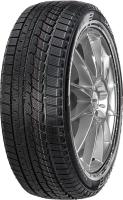
|
The AUSTONE ATHENA SP-901 provides barely adequate steering feedback and is imprecise on dry roads, requiring constant corrections. It tends to oversteer early in dynamic maneuvers, earning it a barely adequate rating for limit behavior. Its braking performance on dry roads is average but rated as good. On wet roads, the tire struggles significantly. Its braking distance is rated as barely adequate, and while it earns a satisfactory rating for longitudinal aquaplaning, it performs poorly in lateral aquaplaning and handling due to low grip levels and early understeer/oversteer tendencies. On winter roads, however, the tire excels, showing the best behavior in the test. It handles securely and precisely on snow, with good results in braking and traction tests. Its ice braking performance is rated as satisfactory. Environmentally, the tire misses a good rating. Its projected lifespan is rated as satisfactory, and although its wear is rated as good, its high weight results in an adequate efficiency rating. Read Reviews | ||||||||||||||||||||||||||||||||||||||||||||||||||||||||||||||||||||||||||||||







